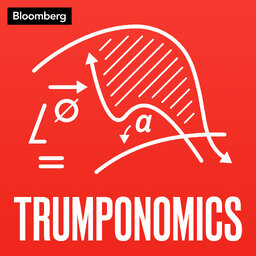How Artificial Intelligence is Taking Over the Economy
From self-driving cars to robot-powered factories, artificial intelligence is taking over significant pieces of the global economy. But while this is good news for the businesses incorporating robots into their workplaces, it also means more and more people will lose their jobs to computers. Joshua Gans, co-author of the recent book "Prediction Machines: The Simple Economics of Artificial Intelligence," explains to hosts Scott Lanman and Christopher Condon what this shift means for the economy, and how it will also impact issues like inequality, monopolies and geopolitical competition.
In 1 playlist(s)
Trumponomics
Tariffs, crypto, deregulation, tax cuts, protectionism, are just some of the things back on the tabl…Social links
Follow podcast
Recent clips

Nigel Farage at Davos: 'The Consensus Era Is Over'
26:59

Live from Davos: Greenland Shock Tests Europe’s Spine—and Strategy—at Davos
38:13

How the Powell Probe Could Blow Up Trump’s Fed Plans
26:25
 Trumponomics
Trumponomics